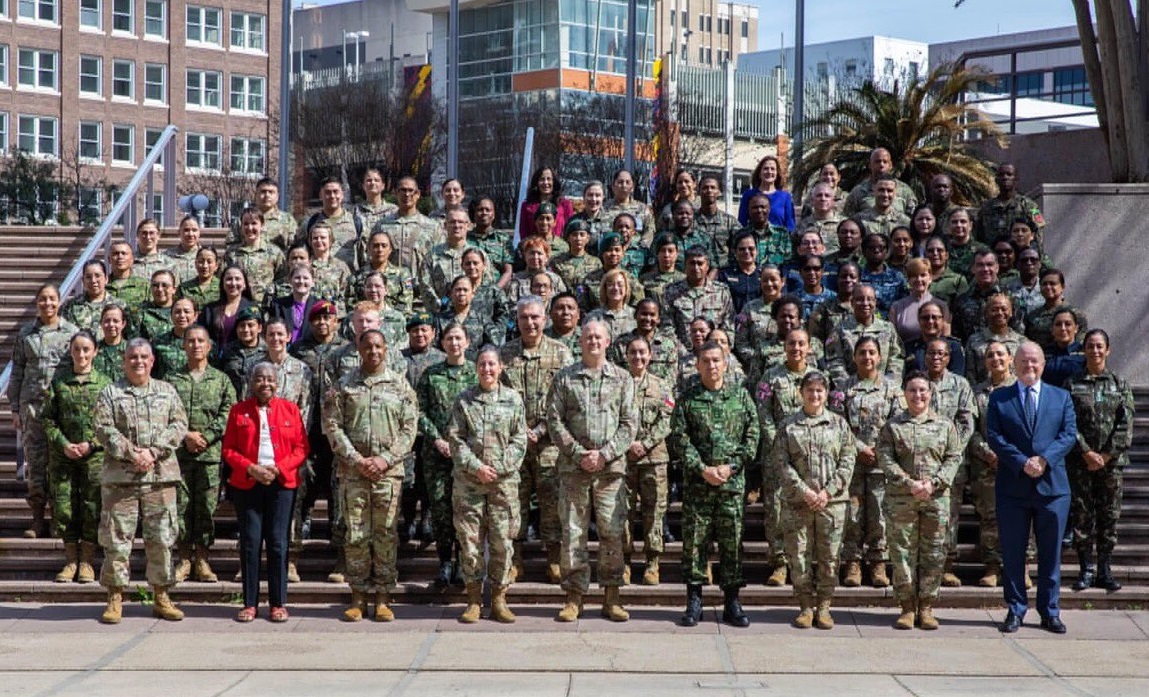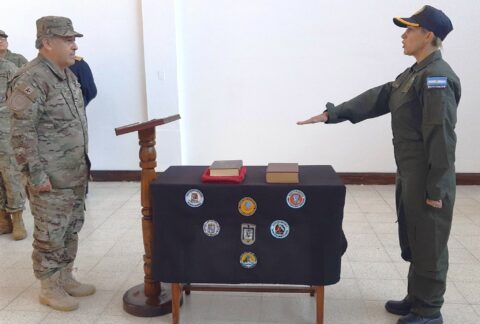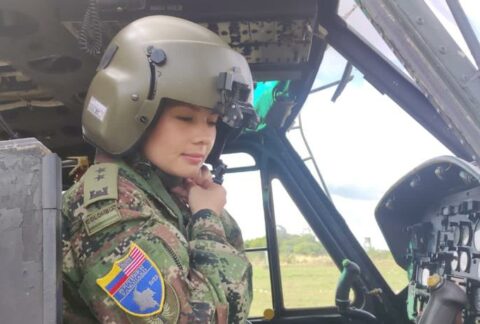Highlighting the opportunity to strengthen ties with Latin American and Caribbean partner nations through military women empowerment, U.S. Army Major General William L. Thigpen, U.S. Army South commanding general, welcomed participants to the first-ever Army South’s Women, Peace, and Security (WPS) Symposium, in San Antonio, Texas, February 21-24.
“Our goal is to ensure that leaders at all levels understand that gender integration matters for the strength and professionalization of the forces. It greatly enhances our decision making. It accelerates multinational operations and creates forces capable of winning against any adversary,” Maj. Gen. Thigpen said. “By recognizing the diverse role that women play as agents of change and by incorporating their perspectives throughout our plans and operations, we are better equipped to promote regional security […].”
“Our goal is to ensure that leaders at all levels understand that gender integration matters for the strength and professionalization of the forces. It greatly enhances our decision making. It accelerates multinational operations and creates forces capable of winning against any adversary,” U.S. Army Major General William L. Thigpen, U.S. Army South commanding general
The event brought together more than 80 women and men from military and security forces of Argentina, Brazil, Belize, Chile, Colombia, Costa Rica, Ecuador, Guatemala, Guyana, Dominican Republic, Honduras, Jamaica, Panama, Paraguay, Peru, Suriname, and the United States to discuss the role of military women in security, promote team building, strengthen partnerships, engender organizational change, as well as recruit, train, and retain servicewomen.
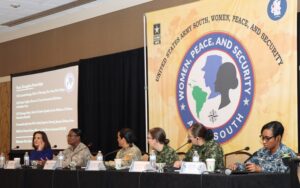
Gender in the military context
The symposium opened with a panel focusing on security. Speakers shared their personal experience of overcoming challenges to fulfill their roles as women, mothers, wives, and military professionals.
“What is important in terms of talking about women in security is the fact that we need to make sure that people know that women belong, that we are here for a reason, and our purpose is to be full soldiers,” said U.S. Army Brigadier General (ret.) Clara Leach Adams-Ender, the first African-American nurse corps officer who graduated from U.S. Army War College. “More than anything else, military women need to make sure that as they go out as women to do their job, they need to understand what their job is, and they have to do it well.”
Building our team and strengthening partnerships were also part of the symposium. The discussions centered on strategies and policies for gender integration, gender discrimination, women in leadership, and sexual harassment, among other topics. It was also an opportunity for partner nations to share their experiences.
“To talk about women and peace is to talk about security, this is a leading topic in this symposium, where we can unite and learn, but above all, it’s an opportunity to project ourselves as military women within the experiences of participating countries, because sharing these experiences helps us a lot to consolidate ourselves as peace builders,” said Colombian Army Lieutenant Colonel Paola Andrea Velasquez Cardona, dean of the Faculty of Law of the General José Maria Córdova Military School.
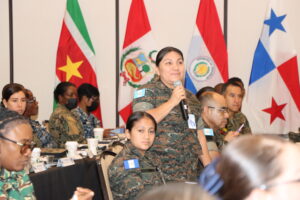
For Guatemalan Army Lieutenant Colonel Vilma Maritza Barrios Carreto of the Ministry of National Defense, “The WPS program is very important; it will open the way for all women in all ranks of the Guatemalan Army to prepare and face high positions. In relation to the security issues, we are going to give tools to all women to empower us with everything we need to face modern challenges.”
Jamaican Defence Force Commander Judy-Ann Icinda Neil, acting inspector general, said that “This event is important not just for Jamaica but for the region. We need to have more forums like this where we can highlight the critical role that women, peace, and security are playing and the initiatives that they are implementing.”
Breaking barriers
Organizational change, recruitment, training, and retention were the topics that captivated participants on day two of the event.
“It’s important from an organizational standpoint to be inclusive in your approach. I think with gender, the biggest part of building and leading change in that regard is inclusivity,” said U.S. Army Lieutenant General John R. Evans, U.S. Army North commanding general. “If you don’t build teams that are inclusive, then you leave a lot of talent on the table […].”
Despite the differences in each military and security forces, female service members face similar challenges, leading attendees to promise to continue their efforts to bring about change in their organizations.
“I hope you all took advantage of this wonderful opportunity to share best practices and lessons learned and develop new ideas or furthering this initiative in the region and around the globe,” U.S. Army General Laura J. Richardson, commander of U.S. Southern Command, told participants in a video message. We all have a responsibility to continue working together toward greater inclusion and to recognize the important roles that women play in today’s military and security forces. I am inspired every day by the strong female leader serving in the military and civilian ranks […]. We can only do this together.”
“We provide a framework that promotes inclusion, conflict prevention, and prosperity for women,” said in her closing remarks U.S. Army Lieutenant General Jody J. Daniels, chief of Army Reserves, the first woman to serve in that position. “But it’s all up to us to ensure that the next generation of women leaders has the tools and skills needed to serve in strategic decision-making roles — as trailblazers in your own right. Each of you has a responsibility to grow that next generation of women leaders and ensure that they are serving at all ranks and all occupations and events. One of the things that I ask my soldiers to do is to tell their story. In the case of this room, we need you all to tell her story.”

